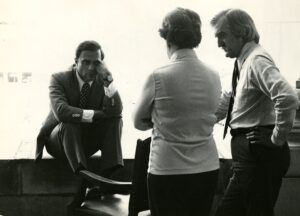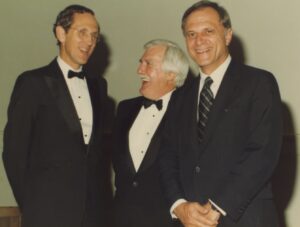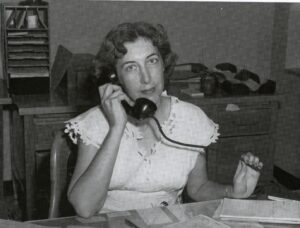calsfoundation@cals.org
Decisions of Consequence: Parker and Lucille Westbrook
Seemingly small decisions can have momentous consequences. The recent publication of an entry on Parker Westbrook on the CALS Encyclopedia of Arkansas, coupled with the Butler Center for Arkansas Studies’ Lucille and Parker Westbrook Collection, illuminates this principle.

Arkansas native Parker Lucas Westbrook was born in Nashville (Howard County) on January 4, 1926. He had two siblings, Lucille and James. He attended the public schools in Nashville for twelve years, and as a requirement for high school graduation, Westbrook (like all other students) needed to complete one year’s study of a foreign language. However, Nashville High School allowed its class on stenography and shorthand to meet its requirement of a foreign language. By accepting that route, Westbrook began a path that would lead him far in a career of public service.
After graduating from high school in 1943, Westbrook attended Chillicothe Business College in Chillicothe, Missouri, for two years. Returning to Nashville, Westbrook used his office skills to obtain a position as court reporter for the Ninth Judicial Circuit of Arkansas.

When Boyd Anderson Tackett was elected to the U.S. Congress in 1948, he hired Westbrook to join his office staff in Washington DC. Westbrook remained in the nation’s capital until 1975, serving in the offices of Representative Tackett, Representative “Took” Gathings, Senator John McClellan, and Senator Bill Fulbright. Westbrook eventually rose to the position of special assistant to Sen. Fulbright. When Sen. Fulbright was defeated by Dale Bumpers in 1974, Westbrook returned to Arkansas and accepted the position of special assistant to newly elected Governor David Pryor.
At Chillicothe Business College, Westbrook had developed an interest in drama, which he continued to pursue in Washington. For several years, he was a member of the Arlington Players, acting in several of their productions.
Over time, though, Westbrook’s attention turned to a new interest, the second seemingly small decision that would have momentous consequences. Westbrook bought and renovated an 1807 cottage in Waterford, Virginia. Work on that cottage acquainted Westbrook with the field of historic preservation and with the discipline’s challenges, requirements, and resources. Westbrook found that Arkansas was lacking in resources for historic preservation. Several projects were underway in the state, but they had little communication with one another and little support across the state. Describing his interest and concern to Governor Pryor, Westbrook found himself appointed to the Arkansas State Review Board of the relatively new Arkansas Historic Preservation Program. Westbrook also quickly became involved in the Arkansas Territorial Restoration in Little Rock (now the Historic Arkansas Museum) and in the Pioneer Washington Restoration Foundation in Washington (Hempstead County), supporting what is now Historic Washington State Park.

In 1976, Westbrook was named an advisor to the National Trust for Historic Preservation. In the following years, Westbrook helped create the Historic Preservation Alliance of Arkansas (now Preserve Arkansas), serving as its first president. He also served on the Main Street Arkansas Advisory Board, the Arkansas State Capitol Association, the Department of Arkansas Heritage Fund Advisory Board, the board of the Texarkana Area Regional Arts and Humanities Council, the board of the Old State House Museum Associates, and the board of the Quapaw Quarter Association. In 1986, Westbrook was given the Distinguished Citizen’s Award by Governor Bill Clinton, and, in 1995, President Clinton appointed Westbrook to the President’s Council of Historic Preservation. Westbrook remained active in his “hobby” of historic preservation until his death on November 29, 2015, shortly before his ninetieth birthday.
In 2007, Westbrook had donated his papers and other materials to the Butler Center along with those of his older sister Lucille. In many ways, Lucille was Parker’s equal in maintaining the history and heritage of the state. Born in Nathan (Pike County) on May 12, 1918, before the family moved to Nashville, Edith Lucille Westbrook remained in Arkansas all her life.
While Parker received average grades in school, Lucille was a straight-A student who skipped second grade and eleventh grade to complete her education in ten years. She attended Harding College in Searcy (White County) before taking a job as clerk for the state’s Employment Security Division in 1937. She also worked one year for the federal Agricultural Stabilization Committee in Howard County, Arkansas. With the United States’ entry into World War II, Lucille obtained an office job at the Southwest Proving Ground near Hope (Hempstead County).

Following the war, Lucille continued working for the U.S. Army Corps of Engineers until her retirement in 1963. She then worked six years in the Arkansas office of Senator Fulbright. In 1968, she was appointed Historian of Howard County. For many years, she authored a column called “Early Files” in the Nashville News, reproducing photographs and sharing historical information about Nashville and Howard County. At the same time, Lucille Westbrook helped found the Southwest Arkansas Regional Archives (SARA), serving as director of the archives from 1990 until 2002. She was a founding member of the Mine Creek Chapter of the Daughters of the American Revolution. Lucille Westbrook died in Nashville on January 31, 2004.
In addition to many documents from their multifaceted careers, the Butler Center’s Lucille and Parker Westbrook Collection also contains a gold mine of photographs and papers from southwestern Arkansas. Records of the Westbrook family and other associated families are included, as are records from William Champs Rodgers, Zida Sain Pope, the Chesshir family, the Power family, the Holbrook and Sullivan families, and the Hutchinson and Thomasson families. Visit the Research Room in the CALS Bobby L. Roberts Library of Arkansas History & Art to view the collection.
This wealth of information is open to researchers today because of the historic preservation instincts of Lucille Westbrook and Parker Westbrook, which can be traced back in part to a pair of seemingly small decisions on the part of Parker as he found his place in the world.
By Steve Teske, archivist at the CALS Butler Center for Arkansas Studies/Roberts Library




